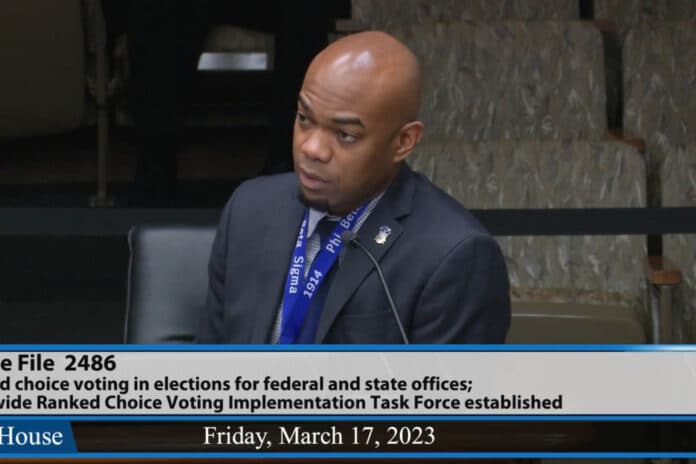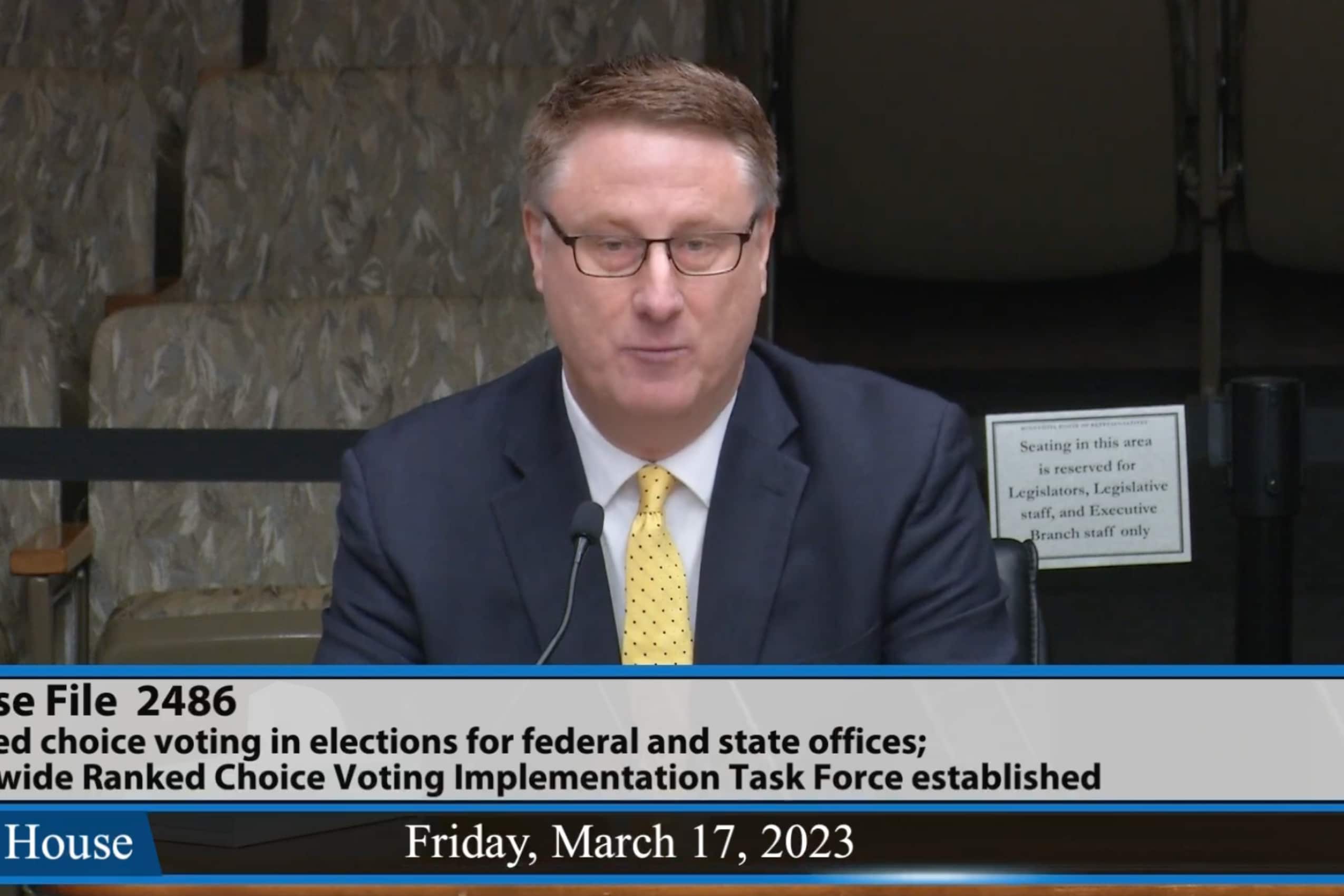
A Democrat lawmaker carrying a bill that would make Minnesota only the third state in the nation to adopt statewide ranked choice voting in its elections said he’s confident he will garner support from Republicans.
That’s despite the fact that Republicans in a House Elections Committee on Friday told Rep. Cedrick Frazier, DFL-New Hope, that his RCV bill has no support from among the 64 Republican members of the House of Representatives.
Why is that relevant when the DFL has a six-seat majority in the House? Gov. Tim Walz is on record telling media that he would honor a gubernatorial tradition of not signing any election reform bill that does not receive bipartisan support. Despite that promise, Walz openly supports RCV in Minnesota.
“You’ve seen me bring a bill to the floor that had no GOP [House members] support until it got to the floor, but it did have GOP votes when we left the floor, so I am confident,” Frazier told committee members in the March 17 hearing on the bill when asked whether the RCV bill has bipartisan support.
The question to Frazier came from Rep. Ben Davis, R-Merrifield, who said he’s checked with his GOP caucus members in the House and none of them support the bill.
“You don’t have bipartisan support for this bill, and it’s going to structurally and fundamentally change our elections,” Davis said during the committee hearing on the bill. “I think that we should not be making a decision when it comes to our elections without bipartisan support from the people that this state elected.”
The seven DFL members present in the House Elections Committee voted to pass the bill, HF2486, onto its next stop, the House State and Local Government Committee. The five Republicans present at the committee voted against moving it along.
Task force would help ‘on-ramp’ RCV for 2026 election
The proposed legislation would implement ranked choice for federal, statewide and legislative elections in Minnesota beginning in 2026. It would give local units of government the ability to pass their own laws and ordinances to enact ranked choice voting. It would also create a ranked choice voting implementation task force to help elections officials “on-ramp” the new system of voting and educate the populace on how RCV works in an election and what a RCV ballot looks like.
Members of the task force would include representatives from several organizations that advocate for underrepresented minorities and civic organizations like the League of Women Voters, according to a provision in the bill.
“This task force will convene and assure that ranked choice voting will be a seamless transition,” Frazier said.
A similar version of Frazier’s RCV bill passed out of a Senate Elections Committee last week, despite testimony in opposition from several citizens and organizations, including the Minnesota Chamber of Commerce, which represents 6,300 businesses across Minnesota that employ more than 500,000 people.
“While RCV is promoted as a means to decrease political polarization and increase voter participation, and lower costs (for elections), academic studies and actual experience call into question those conclusions,” said Brian Cook, a government relations director for the Minnesota Chamber of Commerce. “Minnesota’s experience with ranked choice voting bares this out.”
Secretary of State Simon cautions legislators
One noticeably careful testifier on the bill during the Friday hearing was Secretary of State Steve Simon, who has remained cautious in his public statements on whether he endorses making Minnesota a ranked choice voting state.
Maine (in 2018) and Alaska (in 2020) are the only other states to enact statewide ranked choice voting. Both states have seen building momentum in their legislatures for a repeal of RCV over the last year.
“Leave aside for a minute whether [ranked choice voting] is a good thing to do or a bad thing to do,” Simon said, “I can tell you that it’s an extraordinarily complicated thing to do. There are a lot of moving parts.”
Secretary of State Steve Simon says "Minnesota is not yet ready for statewide ranked-choice voting," calling it an "extraordinarily complicated thing to do." pic.twitter.com/BG3fPzqLU2
— Alpha News (@AlphaNewsMN) March 17, 2023
While elections in Alaska and Maine feature more centralized, state-conducted election systems, Minnesota’s election infrastructure very much relies on counties, Simon said.
“Statewide ranked choice voting could require changing the very architecture of Minnesota’s election system as we know it,” he said.
Grassroots opposition up against well-funded FairVote Minnesota
The ranked choice voting movement in Minnesota has been pushed for the last several years by FairVote Minnesota, which raised nearly $1 million in 2020 for campaigning and outreach activities to promote RCV. Some of FairVote Minnesota’s prominent donors include Kathryn Murdoch, daughter-in-law to media mogul Rupert Murdoch.
Cities that utilize ranked choice voting in their elections include: Minneapolis, St. Paul, Minnetonka and Bloomington. A group of citizens sued the city of Bloomington last year after the City Council threw out their petition which generated more than 3,000 signatures that would put a referendum on the ballot to repeal RCV in Bloomington elections. That followed a 2020 referendum to implement RCV elections in the Twin Cities suburb that passed by only 96 votes.

“When ranked choice voting started first being brought up in Bloomington, we knew it was not popular,” said David Clark, a Bloomington resident and executive chair of Residents for a Better Bloomington, a non-partisan watchdog organization. “In fact, FairVote Minnesota had to spend $165,000 in a slick marketing campaign in order to get people to vote for it, and it only won by a 0.2% margin.”
While those who testified in opposition to the RCV bill also included longtime conservative politico Annette Meeks, and representatives from Minnesota Election Integrity, a nonprofit election watchdog organization, testifiers who support the bill included well-known pandemic expert Dr. Michael Osterholm and General Mills executive Kim Nelson, who both sit on the FairVote Minnesota executive board. Nelson has donated more than $30,000 exclusively to Democrat political candidates, including Congressman Dean Phillips, who helped lead a FairVote Minnesota-sponsored ranked choice voting rally at the Capitol following the bill hearing.
Two volunteer election judges testified against the bill, saying they’ve observed ranked choice voting create confusion and frustration for many voters, including the elderly and those who speak English as a second language.
“Even those that did understand this process expressed frustration over its complications,” said Linda Blair, a Bloomington resident who served as an election judge in her city’s most recent local election. “Ranking the votes caused frustration and caused them to take longer to complete their ballot. I even witnessed one frustrated voter have their ballot spit back out of the tabulator again and have them say, ‘It doesn’t matter,’ and then just walk out in frustration.”
Hank Long
Hank Long is a journalism and communications professional whose writing career includes coverage of the Minnesota legislature, city and county governments and the commercial real estate industry. Hank received his undergraduate degree at the University of Minnesota, where he studied journalism, and his law degree at the University of St. Thomas. The Minnesota native lives in the Twin Cities with his wife and four children. His dream is to be around when the Vikings win the Super Bowl.















